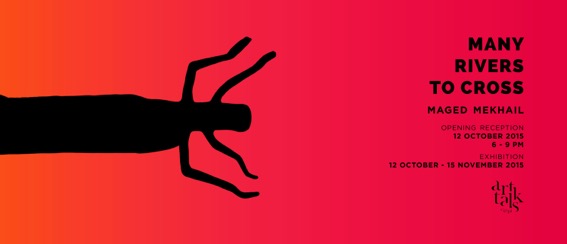
Maged Mekhail transports us back in time and space from Ancient Egypt to Babylon, and from Mesopotamia to further East. Rulers, traders, warriors, men of sciences and prophets crossed roads, ports and oceans seeking larger empires, flourishing trade and the spread of religion. Thousands of years later, their great grand-children are crossing the roads again – this time heading West, seeking refuge and escaping civil wars and violence. Crossing is no longer the means to enlarge one’s home, but rather the prevalent means of survival – to escape from home. In Many Rivers to Cross, painter and sculptor Maged Mekhail choses to ignore the slow decline of our present and brings to light our past by exploring the traces left behind the convergence of national, racial and ethical lines that supposedly should bond us together. He embraces the endless possibilities of remembrance and provides a multi-dimensional representation of the Egyptian world. The many different chapters across a span of thousands of years appear as fragments absorbed into Mikhail’s works, calling on a transcendent power to provide some meaning to guide our fragile present.
Instead of falling into nostalgia, remembrance turns into solace and Many Rivers to Cross playfully explores nonrandom moments, rituals and personae where there is no political perspective but rather snapshots that cement our cultural chains and transform our feelings of belonging to pride.
In El Sebou bronze sculpture, survival and the number 7 are inextricably linked. It’s on the seventh day that a child’s existence is formally acknowledged to the world in a ritual that dates back to Pharaonic times. El Sebou links birth to gender symbolism, to folk beliefs, to womanhood, and to the importance of the timelessness of a tradition still equally practiced by followers of the two prevailing religions across Egypt. The thread is our common past and Mekhail insists on holding on to these rites of passage, instead of moving on to Western fashions of baby showers.
Kemet, the first nation of our modern day history and the ancient name of Egypt in 3100 BCE, is another bronze work deriving from a distant memory and in which Mekhail superimposes a symbol of a different era. The Bible, in the Old Testament, repeatedly refers to Egypt as the “Land of Ham” (Khem / Kemet), which refers to its black soil. Mekhail then adds the Eagle of Saladin, the Ayubbid Sultan who ruled Egypt and Syria and defeated the Crusaders in the 12th century, and which is still used in the current Egyptian flag.
Womanhood continues to be a recurring theme in Mekhail’s work using his contorted signature depiction of the body parts. Today, as during his last show in 2013, there is energy and rhythm, there is sensuality and nudity and there is love and ecstasy. Maged Mekhail ushers the viewer into the intimacy of Ghazia, the modern gypsy folk dancer in rural areas and the semi-nomadic entertainer in moulids known as the beautiful temptress. Originally from the Indian subcontinent, the ghazia came to work as Harem dancer in Middle Eastern courts, until Mohammed Ali banished them from Cairo in the nineteenth century – later to be romanticized in movies.
Recognizing the diversity in our region, Mekhail dreams up Ishtar, the Babylonian and Assyrian goddess of love, war and fertility and imagines, as a bird, Theodore, the gift of God in Greek, whose name was popular among early Christians and borne by several saints. Mekhail carries on with Kawkab el Shark (Star of The East), the portrayal of Om Kolthoum and the only modern character that functioned fluently across the Arab world.
Beside references to the entrenched influences of Greco-Roman, neo-Pharaonic and Coptic art in Fatoun, Nashwa and Farah, Maged Mekhail takes us farthest east with Budda and celebrates the philosophical and religious correlations between Ancient Egyptian Religion and Buddhism culture that may not be known to many.
Many Rivers To Cross is, in part, a tribute to our ancient collective past that forms who we are today. Ever since he carved his own place in contemporary Egyptian art, thirty-three year old Maged Mekhail has sought to say something, many things indeed, hoping that, whether we cross or not, our pride will keep us alive.